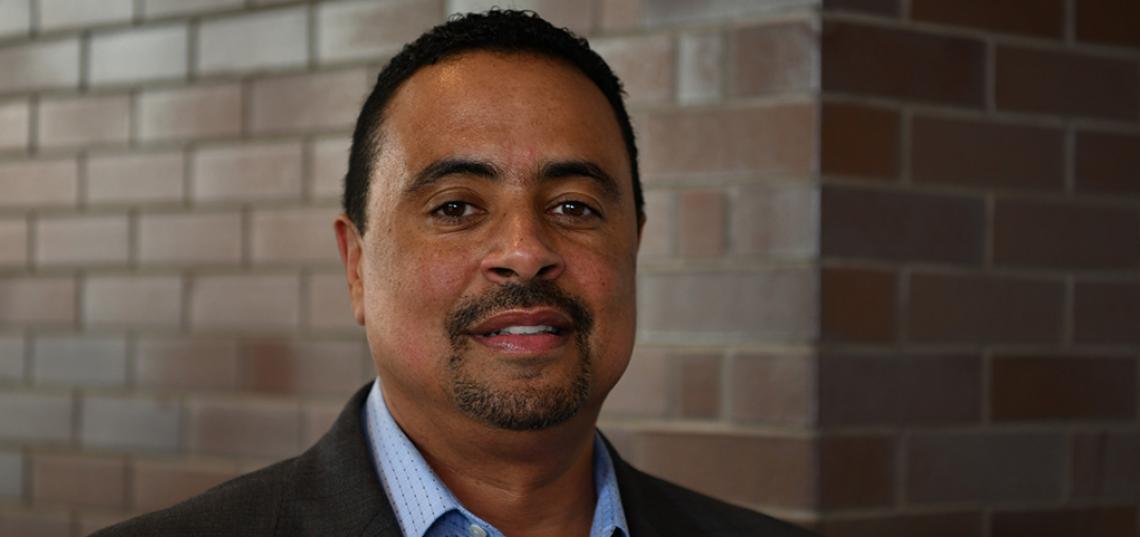
Having completed a Masters in Social Work (MSW), in addition to a Ph.D. in information science before joining the School of Communication and Information (SC&I) faculty as an Assistant Professor of Library and Information Science, Charles Senteio is very committed to community health and wellness research by engaging social work practice and, and public libraries that continue to play a key role in their local communities as trusted sources of health information.
In merging Library and Information Science with social work practice, Senteio collaborated with SC&I colleagues Part-Time Lecturer Nancy Kranich and recent Master of Information graduate Kristen Matteucci,’18 to enable the East Brunswick Public Library (EBPL) to serve, for the first time, as a field placement site for a Rutgers Master of Social Work student.
“Rutgers has successfully placed social work students in libraries in the region. Libraries reflect their communities, and some of their users may be experiencing distress such as mental health problems, drug addiction, and homelessness.” Kranich said. “A trained social worker can work in tandem with librarians to intervene if and when necessary, as well as guide librarians in best practices for dealing with difficult life challenges.”
As a result of this collaboration, a MSW student, Sheena Mathew, from the Rutgers School of Social Work, will be placed at the EBPL beginning in the Fall of 2018, and will work closely with Karen Parry, Manager of Information Services (MLS ‘86) and her team of certified health librarians to support library patrons as sources of health and wellness information. As a
Licensed Master Social Worker (LMSW) Senteio has the necessary social work credentials to serve as her field placement supervisor.
“Having social workers at libraries is an excellent way to approach and serve people in need, irrespective of what their needs are and to approach, support and guide them in a non- threatening manner,” Mathew said about her placement.
Parry said she hopes the MSW placement will help the EBPL Patrons. “Librarians receive questions pertaining to social needs and mental wellness from new immigrants and seniors. In addition, librarians began receiving more questions from teens, middle-aged people in crisis through no fault of their own, even children coping with academic stress and anxiety. EBPL hopes that the MSW intern will fill a critical gap by utilizing skills that are unique to the social work field.” Parry said she hopes the MSW placement will help the EBPL patrons.
Senteio explained that placing social workers in libraries can be particularly helpful, because patients may not ask their care providers all of their questions about their health and wellness at their primary care visits. Some people may even be reluctant to seek out health information from their physicians for questions such as, “What's the difference between a brand name and a generic drug since the brand costs a lot more?” Senteio said.
Kranich said, “Though not yet a trend, social workers are showing up more and more in libraries to help them deal with the multitude of problems that some residents face. As a sanctuary, it’s encouraging that libraries keep finding additional ways to ensure that everyone in the community feels safe at the library through a variety of services ranging from information and referral, to intervention.”
As Mathew’s Field Placement Supervisor, Senteio will help Matthew connect her work at the EBPL with what she learns in the classroom. He will also meet with Mathew regularly to review how she has managed the questions and issues she has encountered while assisting EBPL patrons.
“I come at this new role as a field placement supervisor specifically from a chronic disease disparities and outcomes improvement point of view. So, hopefully, I can offer my practical experience, not just in terms of social work, but also incorporating my research in identifying barriers to care, specifically barriers to health information exchange.” Senteio says on what he hopes to bring as a field placement supervisor.
“As a licensed social worker and community health informatics researcher,” Senteio said, “I see how collaborations between libraries and social workers demonstrate the power of academic-community partnerships. One of the challenges to community-based research is maintaining a reciprocal relationship with individuals and community organizations beyond just an indiviudal project, specifically recruitment and data collection.”
This is another part of the reason Senteio believes this partnership is important. Researchers, such as himself, he explained, have been rightly criticized for entering communities when they need to collect data and then leaving without giving much back, if anything.
“The way I grew up in research, and was trained, was that researchers should develop a reciprocal relationship with the people in the communities that we wish to researh. We are not just collaborating in order to collect the data we need, but we also incorporate the community individuals into the work as a part of the research team.
“In the past, the EPBL has helped us recruit study participants and so, when EBPL health librarians brought up the idea that having a social worker at the library could help them support their patrons, I immediately thought that helping to make that happen was a way that I could support their needs in order to help nurture the ongoing relationship.”
To learn more about the Library and Information Science Department at SC&I, please click here.
